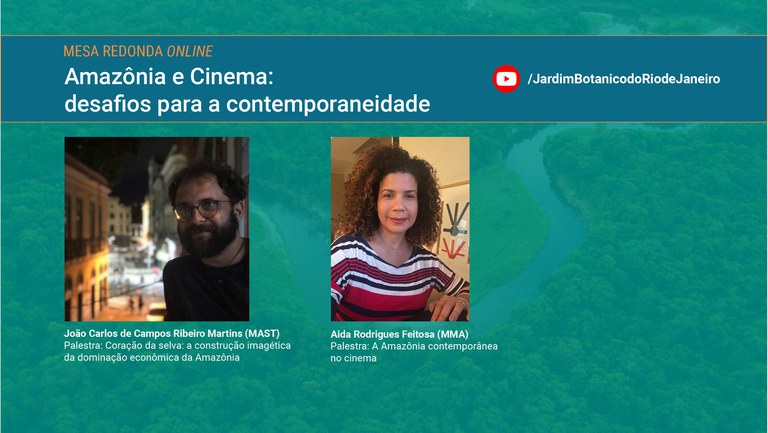Notícias
Online round table discusses representations of the Amazônia in cinema

The Rio de Janeiro Botanical Garden is promoting the round table "Amazonia and Cinema: challenges for contemporaneity", on December 14, at 2 p.m, on the JBRJ YouTube channel. The guests are João Carlos de Campos Ribeiro Martins (Museum of Astronomy and Related Sciences - MAST) and Aida Feitosa (Ministry of Environment and Climate Change- MMA).
In the lecture "Heart of the Jungle: the imaginary construction of the economic domination of the Amazon", João Carlos de Campos Ribeiro Martins will discuss how the documentary "No paiz das Amazonas" (1923), by Silvino Santos, contributed to the image of the Amazon as a source of resources to be dominated. Divided into blocks dedicated to the raw materials of the forest, the film by the Portuguese director based in Manaus is based on the idea, very present in the 19th century, that that region of the country should be "enlightened". The concept of a local Belle Époque financed by the exploitation of natural resources was the ultimate goal of a Eurocentric project for a country treated as savage. The documentary produced by Joaquim Gonçalves Araújo, released a hundred years ago, was shown in cinemas in Rio de Janeiro for five months at the time.
"The Contemporary Amazon in Cinema" will be the theme of Aida Feitosa's lecture, which will look at three films that have the Amazon as their current location, analyzing multiple images and visions of this immense biodiverse territory. Alien Nights (2022), directed by Sergio Carvalho, The Last Forest (2021) and Ex-Pajé (2018), both directed by Luis Bolognesi, respectively bring points of view on the tragic reality of the youth of Acre's capital, Rio Branco, who live with criminal and lethal trafficking, the daily life of the Yanomani indigenous reserve, in Roraima, which struggles between the preservation of its culture and the illegal invasion of mining, and the reflections and fears of a former Pajé from the Paiter Suruí indigenous community, in Rondônia, colonized by Christianity and development.
João Carlos de Campos Ribeiro Martins is a screenwriter, journalist and documentary maker. In 2014, he was one of those selected for the Ibermedia/Taller de Guión program. He has directed a number of short films, including Amazonas Tilt (winner of the 2016 Arquivo em Cartaz award). For television, he directed the series Refugiados (2017) for Canal Futura. She has a master's degree in Comparative Literature from UFF and is a PCI fellow at the Museum of Astronomy and Related Sciences (MAST), in the project Voices of Science in Brazil.
Aida Rodrigues Feitosa is a doctoral student in Communication and Culture at UFRJ, with a master's degree and a bachelor's degree in Communication from the University of Brasília. She is an Environmental Analyst at the Ministry of the Environment, in the Department of Environmental Education. Her main research themes are space, city, environment, climate, youth, blackness, aesthetics, image, cinema, photography. She is a member of the Brazilian Society for Cinema and Audiovisual Studies (SOCINE). She is a member of the Muniz Sodré Racial Relations Study Group (LECC/UFRJ), the Beatriz Nascimento Collective (Group of Black and Indigenous Students at PPGCOM/UFRJ) and the Commission of Journalists for Racial Equality (Cojira).
Mediation: Claudia Rabelo Lopes, S&T analyst (JBRJ) and Master in Communication Languages and Technologies from ECO/UFRJ.
Organization: Alda Heizer and Claudia Rabelo Lopes.